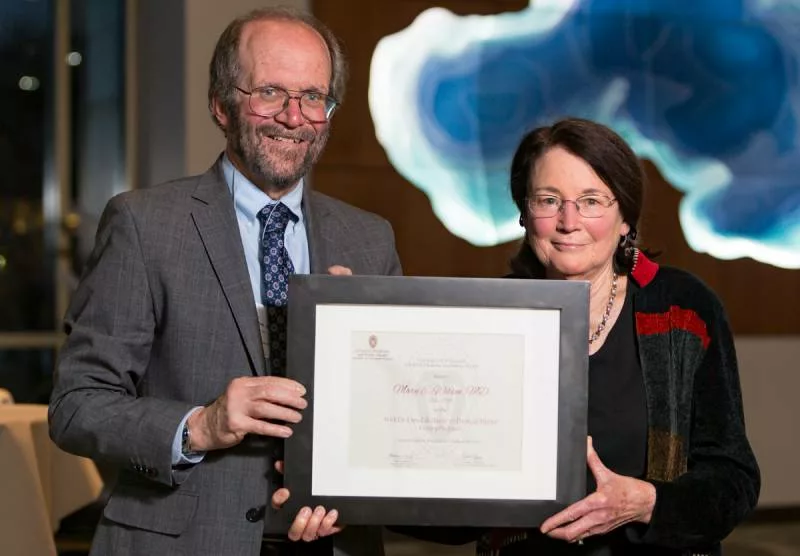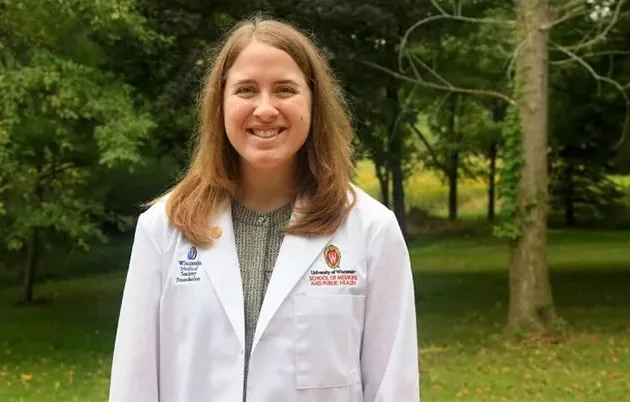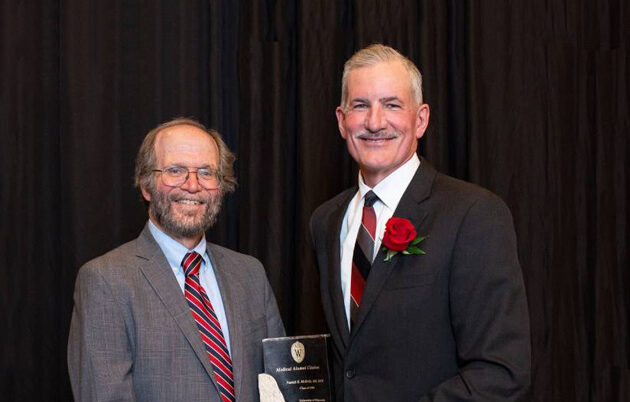“Mary Wilson has been a long-standing expert in global health and understands how human-induced disruptions — including climate change, ecological change and the overuse of antibiotics — lead to emerging and resurgent diseases,” says Global Health Institute Director Jonathan Patz, MD, MPH, the John P. Holton Chair of Health and the Environment. “She has been a pioneer with her work at the intersection of global environmental change and infectious disease.”
The Challenge of Being Too Good
Antibiotics such as penicillin have been one of modern medicine’s greatest success stories, providing relief for patients with infections from strep throat to pneumonia. And drugs with antibacterial, antimalarial and antiviral activity — collectively called antimicrobials — include treatments for diseases such as tuberculosis, malaria and HIV/AIDS.
“Now, time with these drugs is running out,” the World Health Organization wrote when it named antimicrobial resistance one of the top 10 threats to world health in 2019. The rise of antibiotic resistance has continued despite development of new and broader spectrum antibiotics to replace those that no longer work.
The “golden era” of easy antibiotic discovery, however, is over, Wilson says. Many pharmaceutical companies have stopped developing new antibiotics and, instead, focus on medications to treat chronic diseases that often require daily doses; in contrast to antibiotics, these continue to work year after year.
The challenge of confronting antibiotic resistance — and untreatable infections — is multifaceted, and the answers cut across the health of humans, animals and the ecosystem.
Wilson elaborates, “Antibiotics are a shared resource. Most drugs, if you take them, will have no impact on other people. When you take an antibiotic, if your bacteria become resistant to it, they can potentially spread to other people or reach the environment. Taking an antibiotic can have a community impact.”
Use and overuse of antibiotics in humans and animals is one facet of the problem, as is the discrepancy between drugs available in wealthy and resource-poor settings. While many antibiotics are overused in the United States, in some countries people are dying because they lack access to antibiotics.
Wilson also looks further downstream at what she calls “the afterlife of antibiotics.” The drugs don’t disappear after they’re used to treat infections, she says. Instead, some part of the antibiotic flows out of the body, either unchanged or as biologically active molecules, in human and animal waste. While human waste often is treated in the United States, in many countries it is not, and animal waste often is left untreated.
“Can it affect human and animal health? We have looked at what antibiotics do to the human gut microbiome, but few have looked beyond the human body. We haven’t thought enough about what impact residues of antibiotics from human and animal use are having on bacteria in the environment, in water and soil,” says Wilson, who suggests a multi-pronged approach to protect all health.
“There are a lot of things we need to do beyond decreasing the use of antibiotics,” she says. “We need to engage the global community in a one-health approach and work to reduce the need for antibiotics.”
An Unlikely Path to Global Health
Wilson’s career began with an undergraduate degree in French, English and philosophy in an era when women were expected to teach rather than become doctors. She taught French and English for three years, nearly finished her master’s in English literature and prepared to go for a PhD when she decided that she really wanted to go to medical school.
Her medical career began with a cold call to the School of Medicine and Public Health (then called the UW Medical School) to ask if she could talk with someone about applying. Successful, she earned her medical degree at UW–Madison, completed an internal medicine residency and infectious disease fellowship at Beth Israel Deaconess Medical Center in Boston and devoted 20 years as chief of infectious diseases at the Harvard University-affiliated Mount Auburn Hospital.
Her interest gradually expanded from clinical medicine to global health. She lectured in Harvard’s Center for Health and the Global Environment course and found colleagues interested in looking at big issues that affect global health, including climate and vector-borne infections.
During an infectious diseases fellowship at Harvard, she worked in Haiti at the Albert Schweitzer Hospital, where she saw socioeconomic, environmental and other factors that are vital to health.
Wilson became deeply involved in international work with infectious diseases and antibiotics. As a member of the Pew National Commission on Industrial Farm Animal Production, she visited massive farm operations a decade ago and learned how broadly antibiotics are used in animalproduction facilities in the United States.
“I don’t think most people are aware that more antibiotics go into food animals in the United States than into people,” she says. “They’re also used in aquaculture and used to treat honeybees, fruit trees and other plants … We need much more integrated communication across sectors.”
As a special advisor to the GeoSentinel Surveillance Network, Wilson continues to explore how disease differs by location and how travel affects the spread of pathogens and antibiotic resistance. She’s served on the Advisory Committee on Immunization Practices of the U.S. Centers for Disease Control and Prevention and on the Academic Advisory Committee for the National Institute of Public Health in Mexico.
Wilson has worked and lectured in many countries including Bangladesh, Brazil, Italy and China, and she wrote “A World Guide to Infections: Diseases, Distribution, Diagnosis.” She is a member of the Board of Visitors for the UW Global Health Institute, which encourages collaboration across disciplines and supports research, education and outreach to improve the health of humans, animals and the planet. The institute is guided by a global health ethic that looks to improve health today while ensuring that resources are available to provide health for all tomorrow.


